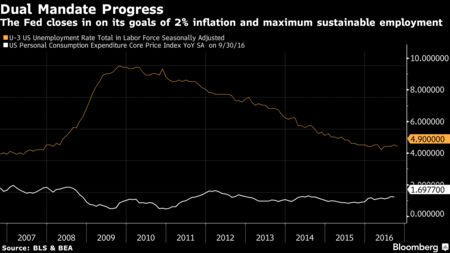She told lawmakers on Thursday that she intends to stay in the job until her term expires in January 2018 while extolling the virtues of the Fed’s independence from political interference.
According to Bloomberg, she also defended financial regulations that the president-elect has attacked and cautioned both him and Congress against providing the economy with too much of a budgetary boost at a time when the Fed was already on course to raise interest rates.
“I was confirmed by the Senate to a four-year term, which ends at the end of January of 2018, and it is fully my intention to serve out that term,” Yellen told Congress’s Joint Economic Committee in response to a question.
Trump’s assault on Yellen and the Fed during the campaign -- at one point he accused her of being more political than his Democratic opponent, Hillary Clinton -- had prompted speculation that he would try to pressure her into stepping down early.
While his advisers have said that’s not his intention, they’ve also suggested that the Republican probably wouldn’t reappoint her when her term comes up.

Yellen, the first woman to head the Fed in its 100-year-plus history, was appointed by President Barack Obama and served in Bill Clinton’s Democratic administration.
She suggested the Federal Open Market Committee wouldn’t be knocked off course from raising interest rates next month after Trump won victory last week on a campaign that the economy was in terrible shape.
The labor market is continuing to improve and inflation is starting to rise toward the Fed’s 2 percent goal amid signs of increasing wage gains, she said.
December Hike
“She did what she needed to do: She signaled the likelihood of a December rate hike,” Stephen Stanley, chief economist at Amherst Pierpont Securities LLC in New York, said in a note to clients.
With the U.S. close to full employment, Yellen counseled Trump and the Republican-led Congress to be cautious in loosening fiscal policy through big tax cuts and spending increases.
Noting that investors have already concluded that such steps could lead to higher inflation, Yellen said the Fed would be watching what develops and would react accordingly.
“When there is greater clarity about the economic policies that might be put into effect, the committee will have to factor those assessments of their impacts on employment and inflation and, perhaps, adjust our outlook,” she said.
Some other Fed officials have said they would expect to raise interest rates faster than otherwise planned if Congress provided more fiscal stimulus to the economy.
“Just because someone ran on the economy operating below its capacity doesn’t mean that the Fed is going to change its views,” said Michael Feroli, chief U.S. economist at JPMorgan Chase & Co. in New York.
Debt Burden
Yellen ticked off two more reasons for prudence on the budgetary front. As measured against gross domestic product, federal government debt is already elevated and projected to rise further as more baby boomers retire.
“In addition, with the debt-to-GDP ratio at around 77 percent there is not a lot of fiscal space should a shock to the economy occur, an adverse shock that did require fiscal stimulus,” she said.
She urged the new president and lawmakers to focus their efforts on steps that would increase productivity growth, which she said has been “exceptionally slow” and which is critical to the long-term vibrancy of the economy.
Besides calling for big tax cuts and stepped-up government spending on defense and infrastructure, Trump has also vowed to do away with the central regulatory response to the financial crisis, the 2010 Dodd-Frank Act.
‘Safer and Sounder’
Yellen defended the law, arguing that it had helped make the financial system “safer and sounder.”
“We lived through a devastating financial crisis,” she said. “And many of the appropriate reforms are embodied in Dodd-Frank.”
“I wouldn’t want to see the clock turned back on those, because I do think they’re important in diminishing the odds of another financial crisis,” she added.
Yellen also made clear she’d oppose any attempts to undermine the Fed’s independence. While acknowledging that the central bank was accountable to Congress, she said its ability to look after the long-term interests of the U.S. economy without political interference was good for the country.
“There is clear evidence of better outcomes in countries where central banks can take the long view, are not subject to short-term political pressures,” she said. “And sometimes central banks need to do things that are not immediately popular for the health of the economy.”


